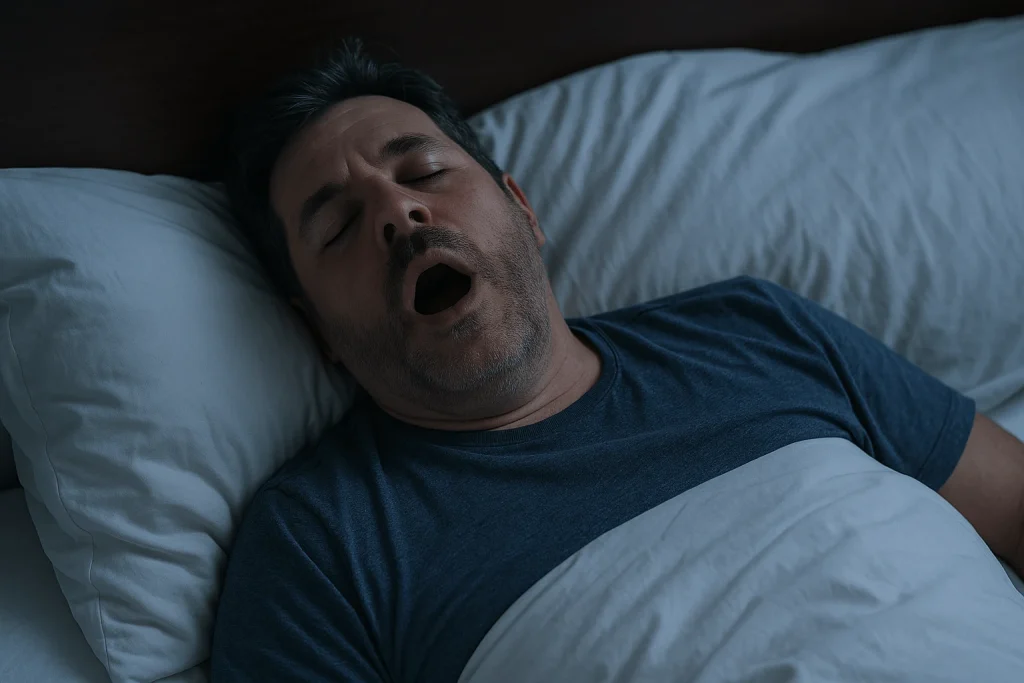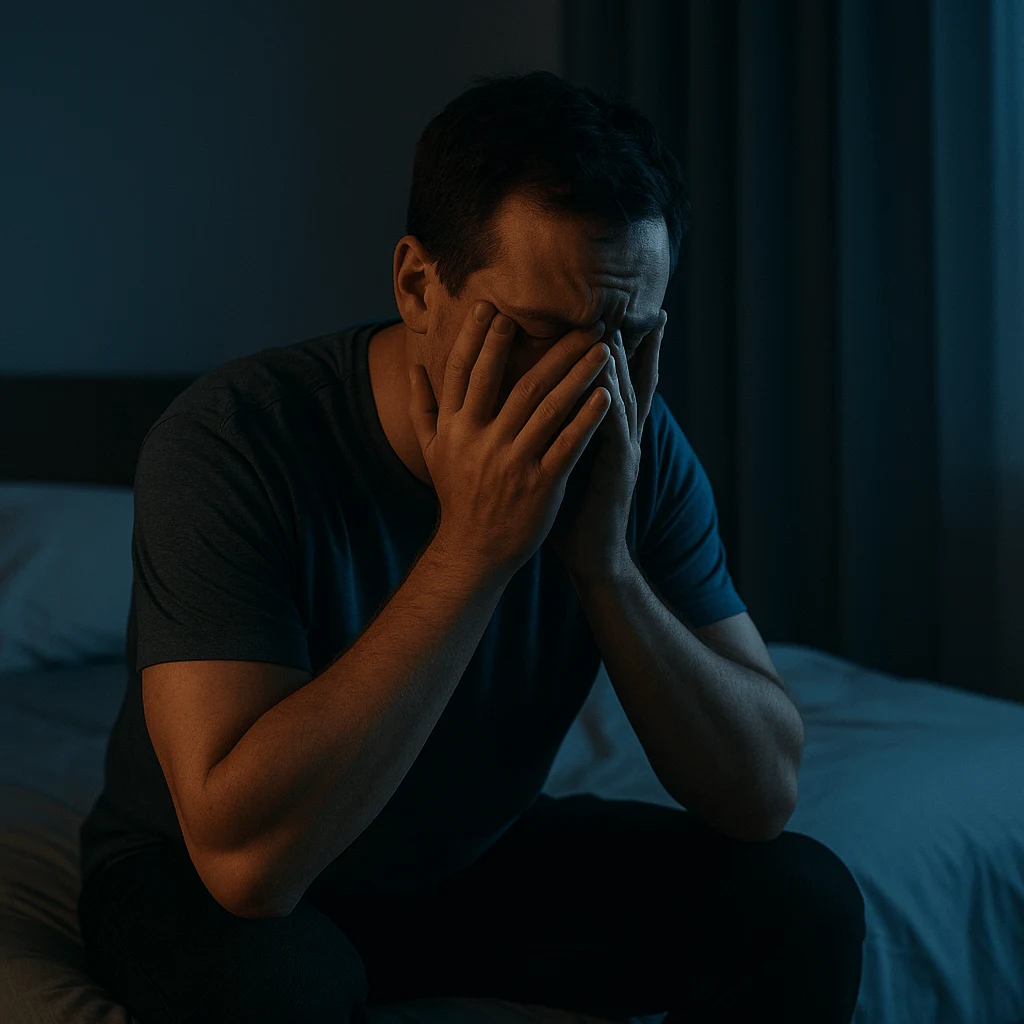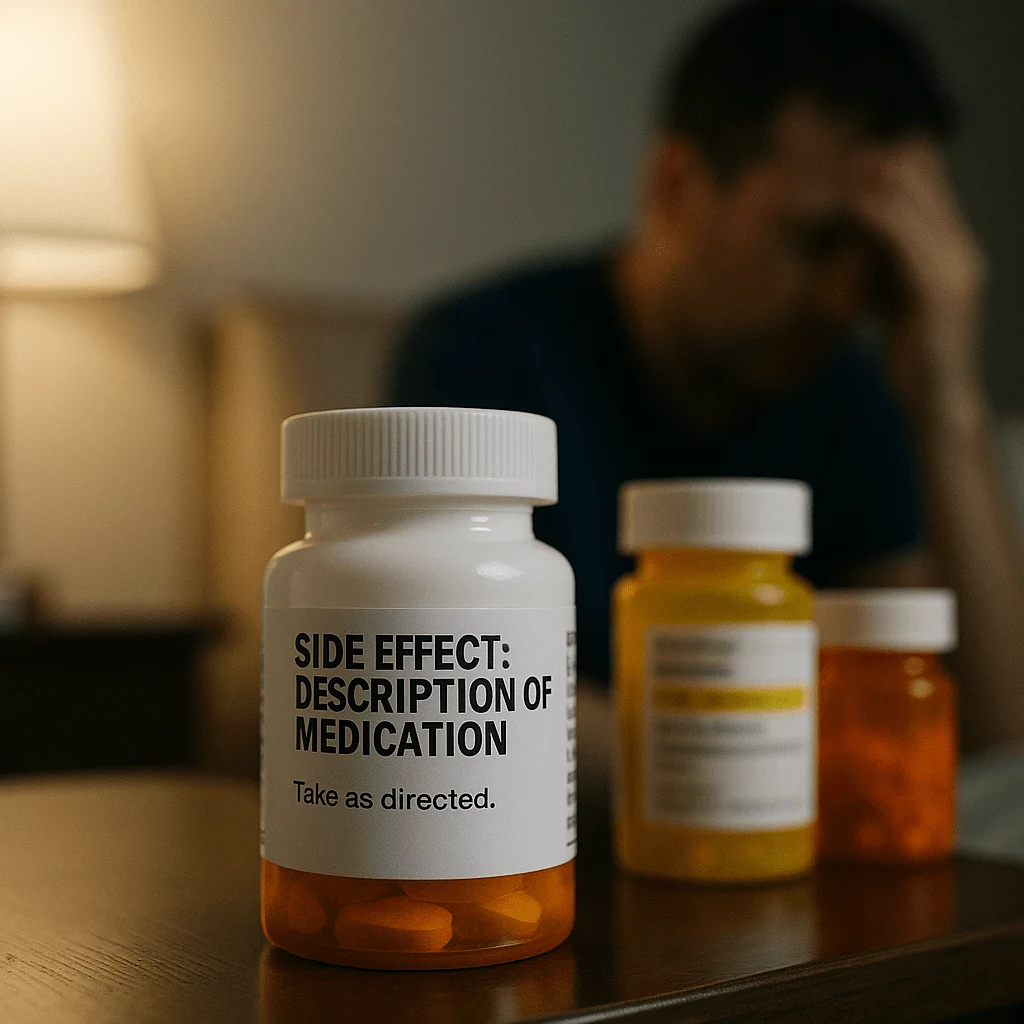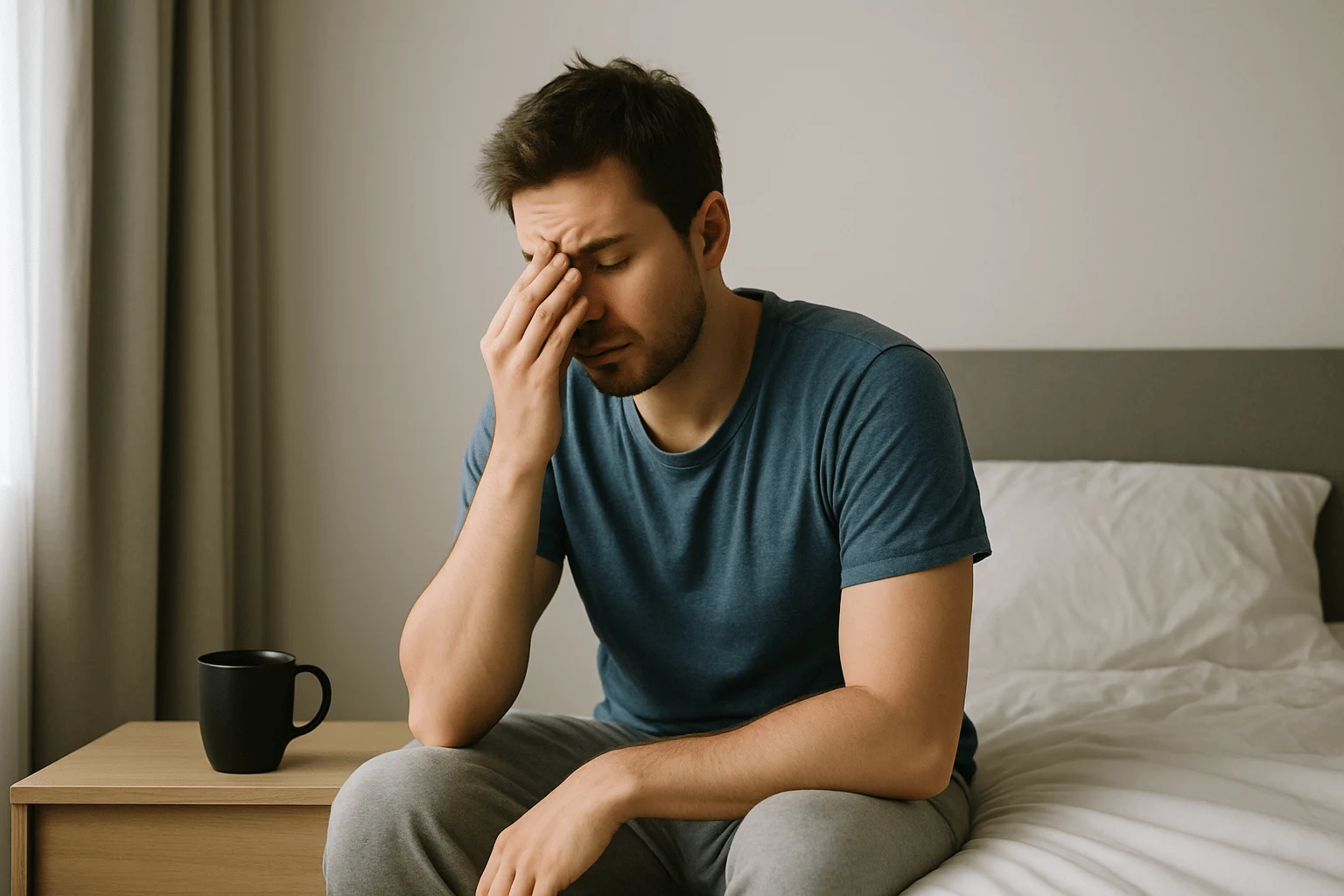Why am I always tired? If you’ve caught yourself asking this question every morning, you’re not alone. Millions of people wake up feeling drained, drag through the day with low energy, and wonder if something more serious is going on.
The truth is, daytime fatigue can come from many different causes — some simple, others more complex. From restless nights and hidden sleep disorders to lifestyle habits and even medical issues, there are several reasons you might be feeling tired all the time.
In this guide, we’ll look at 7 common causes of constant tiredness and what you can do to start regaining your energy. By the end, you’ll not only understand possible reasons for your fatigue but also have practical steps you can try tonight.
1.Poor Sleep Quality Can Leave You Feeling Tired All the Time

Even if you’re getting the recommended 7–9 hours in bed, your body may not be reaching the deeper, restorative stages of sleep. That means you wake up asking, “Why am I always tired?” even after what looks like a full night’s rest.
Signs of Poor Sleep That Cause Daytime Fatigue
- Waking up multiple times during the night
- Tossing and turning without feeling comfortable
- Hitting the snooze button repeatedly in the morning
- Relying heavily on caffeine to stay alert during the day
These are signals that your sleep cycles are being disrupted, leaving your body without the recovery it needs.
Quick Fixes to Improve Sleep Quality
- Stick to a regular bedtime: Going to sleep and waking up at the same time each day helps regulate your body clock.
- Create a sleep-friendly bedroom: Keep your room cool, dark, and quiet. Even small changes — like blackout curtains or a fan — can make a big difference.
- Cut late-night screen time: Blue light from phones or TVs can trick your brain into staying awake. Try swapping your phone for a book or calming routine.
- Watch what you eat and drink before bed: Heavy meals, caffeine, or alcohol too close to bedtime can interfere with your sleep.
👉 Related Posts:
- 8 Sleep Hygiene Habits That Help You Sleep Better Tonight
- 10 Best Foods That Help You Sleep Naturally
2. Sleep Disorders That May Be the Reason You’re Always Tired

Sometimes the answer to “Why am I always tired?” isn’t just about late nights or stress — it could be an underlying sleep disorder. These conditions are more common than most people realize and can quietly drain your energy, even if you think you’re sleeping enough hours.
Sleep Apnea and Daytime Fatigue
Sleep apnea is a condition where your breathing repeatedly stops and starts during sleep. Many people don’t even realize they have it — they just wake up feeling exhausted no matter how much time they spent in bed.
Signs to watch for: loud snoring, waking up gasping for air, morning headaches, or extreme daytime sleepiness.
Why it matters: Without enough oxygen and restorative sleep, your body can’t recharge properly.
Restless Legs & Insomnia
- Restless Legs Syndrome (RLS): That irresistible urge to move your legs at night can make it nearly impossible to fall asleep, leading to constant tiredness the next day.
- Insomnia: Trouble falling or staying asleep night after night doesn’t just leave you groggy — it can also affect memory, focus, and mood.
For people struggling with insomnia, lifestyle habits and calming routines can make a difference. Some also turn to natural aids like magnesium or herbal remedies. You can learn more in our post on beginner-friendly sleep supplements.
What You Can Do
If you suspect a sleep disorder, it’s important to talk with a healthcare provider. Simple treatments — from lifestyle adjustments to medical devices — can dramatically improve energy and quality of life.
3. Lifestyle Habits That Contribute to Feeling Tired All the Time

Not every case of constant fatigue comes from a medical condition — often, it’s rooted in your daily routine. The way you eat, move, and manage your day can determine whether you feel energized or completely drained.
Diet and Hydration Mistakes
- Relying on sugar or refined carbs: Quick spikes in blood sugar give you energy for an hour, then leave you sluggish and craving more.
- Skipping meals: Going long stretches without food can cause low energy, irritability, and brain fog.
- Not drinking enough water: Even mild dehydration can make you feel tired and unfocused.
Activity Levels and Energy Drain
- Being sedentary: Spending long hours sitting — at a desk, in the car, or on the couch — reduces circulation and makes fatigue worse.
- Overexercising without recovery: On the flip side, pushing your body too hard without enough rest can leave you run-down and exhausted.
Daily Rhythms That Work Against You
- Constantly changing wake-up times
- Overloading your schedule without downtime
Small Tweaks That Help Restore Energy
- Eat balanced meals with lean protein, complex carbs, and healthy fats
- Keep a water bottle handy to stay hydrated
- Add movement breaks throughout the day — even 5–10 minutes of stretching or walking helps
- Build in short “recovery moments” (deep breathing, light journaling, or stepping outside)
4. Stress and Mental Health: Hidden Causes of Constant Fatigue

Stress doesn’t just weigh on your mind — it can be one of the biggest answers to “why you’re always tired.”
How Stress Disrupts Sleep and Causes Daytime Fatigue
When you’re under chronic stress, your body produces more cortisol (the stress hormone). While this helps in short bursts, long-term elevation can:
- Disrupt your natural sleep cycles
- Leave you feeling “tired but wired” at night
- Cause shallow, restless sleep that never feels refreshing
Fatigue Linked to Anxiety and Depression
- Anxiety: Racing thoughts make it difficult to fall asleep, keeping your nervous system on high alert. Even if you sleep, it rarely feels restorative.
- Depression: Fatigue is one of the hallmark symptoms. Some people oversleep, others wake up too early — both patterns leave you drained during the day.
Practical Ways to Ease Mental Strain
- Set boundaries with technology
- Try calming routines like journaling or meditation
- Stay connected with friends or a counselor
- Seek professional help if needed
5. Medical Conditions That Could Explain Why You’re Always Tired

Sometimes feeling tired all the time has less to do with sleep itself and more to do with what’s happening in your body.
Thyroid and Hormonal Imbalances
Hypothyroidism slows metabolism, leading to fatigue, weight changes, and brain fog. Hormonal shifts like menopause can also sap energy.
Blood Sugar Problems and Diabetes
Blood sugar swings often cause shakiness, fatigue, and poor focus. For people with diabetes or prediabetes, daytime fatigue is common.
Chronic Pain, Anemia, and Other Conditions
Conditions like fibromyalgia, autoimmune disorders, or low iron (anemia) often leave you with constant tiredness, even after sleep.
When to See a Doctor About Ongoing Fatigue
If fatigue is severe, persistent, or paired with symptoms like dizziness or unexplained weight changes, speak with your doctor. A blood test may reveal the cause.
6. Side Effects of Medications That Cause Daytime Fatigue

Certain prescriptions and even over-the-counter drugs can explain why you’re always tired.
Common Drugs Linked to Fatigue
- Antihistamines (allergy meds)
- Blood pressure medications
- Some antidepressants or anxiety medications
- Pain relievers and muscle relaxants
What You Can Do Safely
Never stop a medication on your own. If you think your prescription is leaving you drained, talk with your doctor about timing adjustments or alternative options.
7. Circadian Rhythm Disruptions: A Common Cause of Daytime Fatigue

Your body runs on an internal clock — the circadian rhythm — that regulates when you feel alert and when you feel sleepy. If this rhythm is thrown off, you may feel tired all the time even if you’re technically getting enough hours of sleep.
What Disrupts Your Body Clock
- Shift work: Night shifts or rotating schedules confuse your body’s rhythm.
- Jet lag: Crossing time zones quickly can leave you groggy.
- Irregular schedules: Staying up late some nights and waking early on others confuses your natural cycle.
How to Reset Your Rhythm
- Stick to consistent bed and wake times — even on weekends
- Get morning sunlight exposure to reset your internal clock
- Dim lights and reduce screens before bedtime
Final Thoughts: Why Am I Always Tired?
If you’re constantly asking yourself, “Why am I always tired?”, the answer could be one (or a combination) of the 7 causes we’ve covered — from poor sleep quality and lifestyle habits to stress, medical conditions, or even disruptions in your circadian rhythm.
The good news? Most of these factors can be improved with small, steady changes. Start with the habits you can control — like building a consistent routine, staying active, and making your sleep environment more supportive. And if your tiredness feels overwhelming or persistent, don’t hesitate to talk with your doctor.
Feeling drained doesn’t have to be your “new normal.” With the right steps, you can move from constant fatigue to waking up refreshed and ready to take on the day.
Frequently Asked Questions
1. Why am I always tired even after sleeping?
Daytime fatigue can be caused by poor sleep quality, sleep disorders like sleep apnea, stress, or certain medical conditions. Even if you spend 7–9 hours in bed, disruptions to deep or REM sleep can leave you feeling unrefreshed.
2. Why am I always tired even when I get enough sleep?
If you feel exhausted despite getting “enough” hours of sleep, the issue may be sleep quality rather than quantity. Factors like stress, sleep apnea, or restless legs can prevent your body from reaching deep, restorative sleep.
3. Why do I want to sleep all the time and have no energy?
Excessive sleepiness and low energy may signal underlying issues such as depression, thyroid imbalance, anemia, or chronic fatigue. If this persists, it’s a good idea to talk with your doctor.
4. What medical conditions cause constant fatigue?
Common health issues linked to constant tiredness include thyroid imbalance, diabetes, anemia, and chronic pain. If your fatigue is ongoing, medical testing can help identify the cause.
5. Can lifestyle habits make me tired all the time?
Yes. Irregular routines, poor diet, dehydration, lack of exercise, or overuse of caffeine and alcohol can all contribute to low energy and daytime fatigue.
6. How do I reset my circadian rhythm?
Go to bed and wake up at consistent times, get morning sunlight exposure, and limit bright light or screens before bed to help reset your body’s internal clock.
7. How to stop feeling tired?
Start with small changes like improving your sleep routine, staying hydrated, eating balanced meals, and moving your body during the day. If tiredness continues despite healthy habits, a doctor can help identify hidden causes.
8. When should I see a doctor about being tired all the time?
If fatigue is severe, persistent, or paired with symptoms like unexplained weight changes, dizziness, or pain, it’s important to see your doctor for evaluation.

